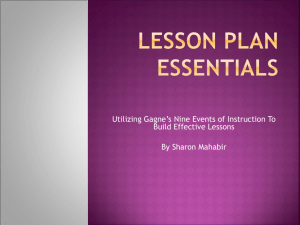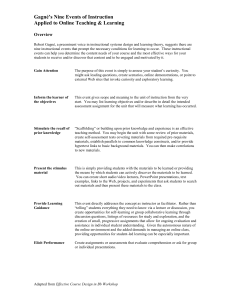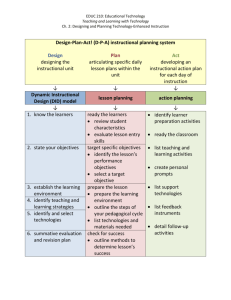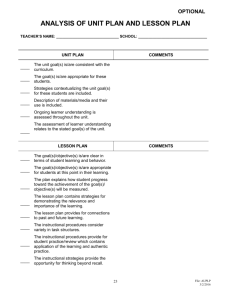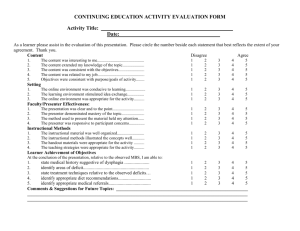Workshop
advertisement
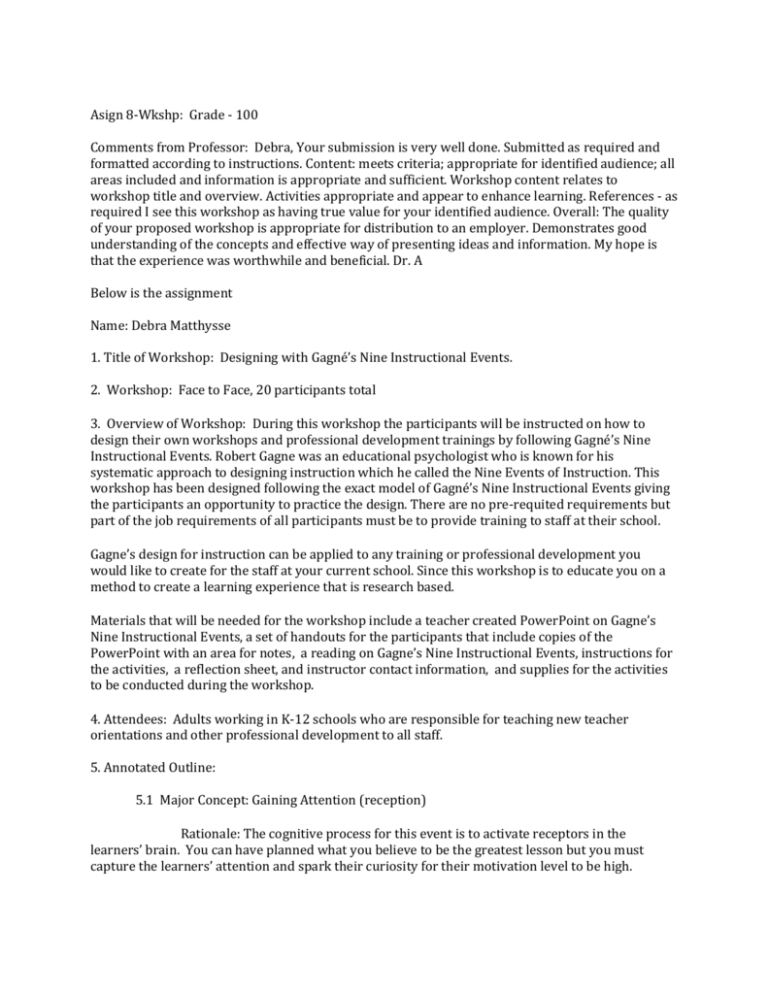
Asign 8-Wkshp: Grade - 100 Comments from Professor: Debra, Your submission is very well done. Submitted as required and formatted according to instructions. Content: meets criteria; appropriate for identified audience; all areas included and information is appropriate and sufficient. Workshop content relates to workshop title and overview. Activities appropriate and appear to enhance learning. References - as required I see this workshop as having true value for your identified audience. Overall: The quality of your proposed workshop is appropriate for distribution to an employer. Demonstrates good understanding of the concepts and effective way of presenting ideas and information. My hope is that the experience was worthwhile and beneficial. Dr. A Below is the assignment Name: Debra Matthysse 1. Title of Workshop: Designing with Gagné’s Nine Instructional Events. 2. Workshop: Face to Face, 20 participants total 3. Overview of Workshop: During this workshop the participants will be instructed on how to design their own workshops and professional development trainings by following Gagné’s Nine Instructional Events. Robert Gagne was an educational psychologist who is known for his systematic approach to designing instruction which he called the Nine Events of Instruction. This workshop has been designed following the exact model of Gagné’s Nine Instructional Events giving the participants an opportunity to practice the design. There are no pre-requited requirements but part of the job requirements of all participants must be to provide training to staff at their school. Gagne’s design for instruction can be applied to any training or professional development you would like to create for the staff at your current school. Since this workshop is to educate you on a method to create a learning experience that is research based. Materials that will be needed for the workshop include a teacher created PowerPoint on Gagne’s Nine Instructional Events, a set of handouts for the participants that include copies of the PowerPoint with an area for notes, a reading on Gagne’s Nine Instructional Events, instructions for the activities, a reflection sheet, and instructor contact information, and supplies for the activities to be conducted during the workshop. 4. Attendees: Adults working in K-12 schools who are responsible for teaching new teacher orientations and other professional development to all staff. 5. Annotated Outline: 5.1 Major Concept: Gaining Attention (reception) Rationale: The cognitive process for this event is to activate receptors in the learners’ brain. You can have planned what you believe to be the greatest lesson but you must capture the learners’ attention and spark their curiosity for their motivation level to be high. Idea: On a large screen in the front of the room play a short video that provides the viewer an overview of Robert Gagné’s 9 Nine Events of Instruction. Explanation: I choose playing this video for a few reasons. The length is 3:32 minutes making it short enough to keep the viewers’ attention. There is no spoken words only slides; black on white with short, easy to read, information on the 9 events of instruction. It begins with a gong followed by music that commands attention. The use of the video will grab the participants’ attention and lay a foundation for what the workshop is about by giving a foundation and validity to what is going to be taught. the use of multimedia will get the audience’s attention. Activity: The participants will watch a short video on Gagne’s Nine Instructional Events. The one I found to use is on YouTube , Gagné's Nine Events of Instruction, url:https://www.youtube.com/watch?v=7G4oSXFXJtM&feature=autoplay&list=PLDE7302EF28CA 176E&playnext=2. 5.2 Major Concept: Informing learners of the objective (expectancy) Rationale: The cognitive process for this event is to set a level of expectation for the learning goals. When you make learners aware of what to expect they are ready to acquire information. Idea: Project on a large screen the learning objectives. Have the teacher read aloud, "Today I am going to show you how to apply Gagne’s Nine Instructional Events when you are developing presentation. You will learn about Gagne’s events, practice by working in pairs and demonstrate the new knowledge with your table group.” Explanation: By projecting and reading aloud the information the participants will, visually and verbally informed on the objectives of the day. This will also be written in the handout. I would keep it short with some details so they would know what to expect for the day. Activity: The participants will sit at round tables, view and hear the information. 5.3 Major Concept: Stimulating recall of prior learning (retrieval) Rationale: The cognitive process for this event is to take information that has been stored in long-term memory and move the ideas to short-term memory. Research has shown that when if the learner can connect new knowledge to prior knowledge, the greatest amount of acquisition happens. Idea: Project on a large screen the question, “Think of a time when you enjoyed learning something new, what made that experience enjoyable?” Explanation: Everyone at the workshop would have many learning experiences to reflex on and by sharing with others; there is an opportunity to hear about others experiences which should spark more memories. others at their table. Activity: The participants will have 5 minutes to discuss this question with 5.4 Major Concept: Presenting the stimulus (selective perception) Rationale: The cognitive process for this event provided in the mind of the learner an awareness of the content. The goal during this event is for the learner to gain new knowledge. Gagne believed that this is best when the content is given to the learner to view. Idea: Utilizing a variety of different media and styles to teach Gagne’s Nine Instructional Events; while projected on the screen, lecture using the prepared PowerPoint, a reading, and a video (one made or found on the web). Explanation: In presenting the information in a variety a ways engages the participants with different learning styles. Activity: The participants will take notes within the provided handout as desired, read a provided article and reflect on the new knowledge on paper then share with others and view a video. 5.5 Major Concept: Providing learning guidance (semantic encoding) Rationale: The cognitive process for this event is to transfer this new knowledge from short-term to long-term memory. Since the audience is adult learners, the instructor should give them the liberty to explore with the new information with only intervening when asked or she feels compelled to correct misguided information. Idea: Constructing a large chart on Gagne’s Nine Instructional Events. Explanation: Since the participants are teachers with knowledge of learning theories there might only be the need for the instructor to give hints when asked. Giving the participant the opportunity to manipulate the information with a partner gives everyone a chance to be part of the process. Making the chart is a simple form of organizing information. Viewing others work is another method to encode the information. Activity: The participants will work together to complete the task of constructing a chart on Gagne’s Nine Instructional Events On the table are bags containing sets of cards, large pieces of paper to create the chart, a dark marker for drawing the chart, and tape for placing the cards on the chart. Each card has written on it either one of the 9 events, an explanation of the event, or an example of the event in practice. The instructions for completing this task will be explained in the handout and verbally given. A timer will be projected giving the pairs 15 minutes to complete the chart. Have the participants spread out around the room and make the chart. Once they are complete, have the pairs rotate and view others work. Give the class 10 minutes to move about. 5.6 Major Concept: Eliciting performance (responding) Rationale: The cognitive process for this event is to enhance, further encode, and provide verification in the learner’s brain. When you have the students produce something based on what has been taught, it confirms to them the learning. Idea: Putting Gagne’s Nine Instructional Events into practice. Explanation: The participants must be given an opportunity to design a lesson using on Gagne’s Nine Instructional Events. By giving the groups a choice of lessons that most would have performed many times and should feel very comfortable with the fear of teaching the lesson incorrectly has been removed. This will leave only the task of implementing Gagne’s Nine Instructional Events. They would have also, from the last activity, had an opportunity to read examples of lessons that are similar in nature to those in this activity. Activity: The participants will use a learning activity to write using a sentence or 2 event actions and perform the 9 events needed to teach a lesson. Ideas to teach could include how to make a sandwich, how to diaper a baby, how to apply makeup, how to make a pot of coffee or how to bake cookies. The participants will be given a paper to write out the 9 events and supplies to use for the demonstration. They will be given 20 minutes to work with everyone at the table and then be prepared to share with the whole group. Have the groups read each event stage and act out the lesson. 5.7 Major Concept: Providing feedback (reinforcement) Rationale: The cognitive process for this event is to confirm to the learner the accuracy in the application of the new knowledge. Idea: Provide to the groups feedback on their lesson designs. Explanation: First, while the groups are designing the lessons, give input and feedback. Second, after the lesson is taught, give positive feedback. Activity: The participants will also be given an opportunity to give feedback and ask questions for clarification. 5.8 Major Concept: Assessing performance (retrieval) Rationale: The cognitive process for this event allows the learner to recall the information taught which will reinforce this in long-term memory. This stage does not have to be given as a test or quiz. The assessment can be given as independent practice where the learner would use what they learned to a project or performance of some type. The goal here is for the instructor to have a means to evaluate the learning outcomes. Idea: Measure the learning outcome. Explanation: This is a simple yet effective way to assess if the participants understand Gagne’s Nine Instructional Events. The participants can quickly read and response to questions and the data can easily be analyzed for future use. Activity: The participants will complete a short questionnaire individually that covers Gagne’s Nine Instructional Events. These will be collected for later review. 5.9 Major Concept: Enhancing retention and transfer (generalization). Rationale: The cognitive process for this event allows the learner to retrieve and generalize what they have learned and apply it to a new situation. When a learner can apply the knowledge in real-life circumstances they are working towards mastery setting. Idea: Demonstration the ability to transfer the new knowledge to a different Explanation: When given the opportunity to apply Gagne’s Nine Instructional Events to their own instructional design, this is when Activity: The participants will apply Gagne’s Nine Instructional Events to an on-site workshop to be given at their home school. They will be given an outline to follow that will look similar to the chart they used during event 5.5 in the workshop and space for reflection on their own workshop they gave to staff. They will have 60 days to complete this assignment and return to the district office to receive the full professional development points. 6. References: Buggey, T. (2007, Summer). Storyboard for Ivan's morning routine. Diagram. Journal of Positive Behavior Interventions, 9(3), 151. Retrieved December 14, 2007, from Academic Search Premier database. "Conditions of Learning." Instructional Design. N.p., n.d. Web. 13 Nov. 2012. <http://www.instructionaldesign.org/theories/conditions-learning.html>. "Gagné’s Nine Events of Instruction." The G. Raymond Chang School of Continuing Education. N.p., n.d. Web. 14 Nov. 2012. <de.ryerson.ca/portals/de/assets/resources "Gagné's Nine Events of Instruction ." YouTube. N.p., 8 Mar. 2007. Web. 10 Nov. 2012. <https://www.youtube.com/watch?v=i_8MB9F2cts>. "Instructional Development Timeline." My eCoach. N.p., n.d. Web. 13 Nov. 2012. <http://myecoach.com/project.php?id=12152&project_step=28465>. "Instructional or Learning Design." Colocation | Broadband Wireless | Dedicated Servers | Web Design & Development | DSL | Web Hosting | Infinity Internet. N.p., n.d. Web. 13 Nov. 2012. <http://www.nwlink.com/~donclark/hrd/learning
